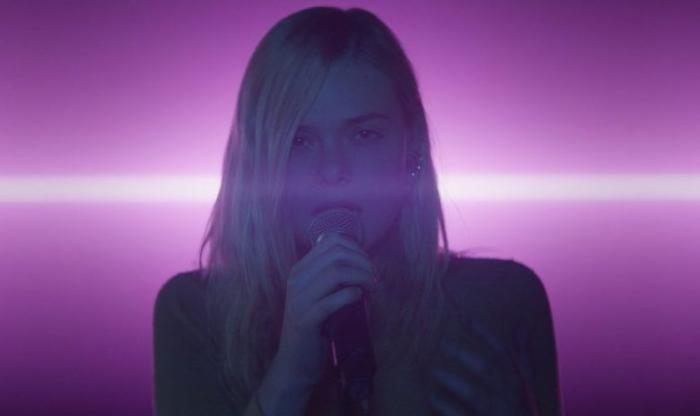By Kayleigh Donaldson | Film | September 14, 2018

TIFF has had a lot of films about female musicians undergoing immense strife this year. For some reason, the stars have aligned in 2018 to give us a new version of A Star Is Born as well as Brady Corbet’s highly divisive Vox Lux. Lagging behind them has been the directorial debut of Max Minghella, the actor who you may know best for his role as Nick on The Handmaid’s Tale. Minghella comes from a prestigious pedigree of film-makers thanks to his late dad Anthony, but for his own dive into work behind the camera, he’s penned a sweet, familiar and familiarly comforting drama about a young woman who just wants to sing. In a year where there seem to be so many of these stories screening in one festival, it’s a shame one this winning has been overlooked.
Elle Fanning plays Violet, the daughter of a single mother living and working on the Isle of White. She likes to sing, keep to herself and avoid difficult conversations with her mum. When the T.V. musical talent show Teen Spirit holds auditions on the island for the first time, she decides to enter but needs a willing adult guardian/manager to help her. Washed up Czech opera singer Vlad (Zlatko Buric) sees a good opportunity in Violet but also the chance to do some good with his life.
You can predict almost every narrative beat of Teen Spirit before you see it but that doesn’t make it any less enjoyable. Indeed, there’s an immense warmth to this story’s familiarity and its willingness to just be what it is. A teen star is born but we only see the build-up, as created through a gloriously spot-on pastiche of British reality T.V., right down to the host choices.
Teen Spirit is slight and could use more room to breathe but there’s something to be said for doing this kind of story in such a stripped down manner. It can’t help but feel refreshing to see this tale be done without the expected clichés: Violet doesn’t ‘sell out’ into pop, nor is the genre treated as some corporate shell; there are no scenes of her friends whining about how much she’s changed; there’s no descent into addiction or public indecency. Really, Violet doesn’t change all that much once she’s on the path to minor stardom through a format that typically doesn’t guarantee long-lasting success. Instead, she’s just a girl who likes singing and through being allowed to sing she is made happier. It’s a welcome contrast from the unbearable nihilism of so many versions of this story in film, and it provides a refreshing reminder of pop’s power, something A Star is Born rejects and is made weaker for it.
The pop music is carefully chosen, with Interscope Records on producer duties and providing top bangers like Robyn’s Dancing on My Own and Lights by Ellie Goulding. They’re all songs that 17 year old girls would actually listen to and the film takes genuine joy in framing them as tools of happiness. Violet worries that she should have chosen a ballad to audition with - and any reality T.V. expert will know the audience benefits of a well-chosen weepy song - but Teen Spirit is savvy enough to know that viewers will emotionally resonate with a modern dance classic. Dancing on My Own doesn’t need a slow piano or acoustic guitar redo to be a moving song. Oh, if only the music industry would understand that.
It almost seems unfair that, on top of her incredible skill as an actress at such a young age, Elle Fanning is also a rather lovely singer. Her voice isn’t astounding but it’s never sold as such. She’s a strong pop singer with a voice well suited to today’s mainstream music and that’s how the film pitches her. This also speaks to the film’s savvy ability to show what it is that the industry is looking for when it talks about talent. They want the complete package, and a pretty white teenage girl with a strong enough voice and a softened personality that can be remoulded is the ultimate ideal. Fanning is always watchable - the way her career has exploded in the past couple of years is astounding to watch but totally deserved - but she’s especially varied in that niche of ‘wallflower teen looking for her moment to shine’. Her Polish isn’t too bad either.
Minghella knows what story he’s telling and the most efficient way to tell it. There are flourishes of detail now and then but broad strokes get the job done, like a scene where Fanning flails around her room while listening to Just a Girl by No Doubt. There are downsides to this approach, such as the lack of development for Violet’s mother, a Polish immigrant struggling financially and wracked with guilt over her husband’s disappearance from their lives. Vlad gets a sad backstory too but no time is dedicated to it, which makes you wonder why this unraveling thread of a subplot remains in the film. If the film is hoping to replicate the vibrant brevity of a music video - and some scenes are straight out of one - then it could have benefitted from another clean up in the final draft.
Teen Spirit won’t change your world but it will give it some light for 90 minutes, and in dark times, there’s an immense appeal to a simple story of a girl who loves pop music. Robyn would be proud.